| Srl | Item |
| 1 |
ID:
103783
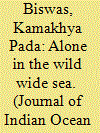

|
|
|
| 2 |
ID:
133692
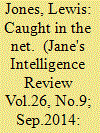

|
|
|
|
|
| Publication |
2014.
|
| Summary/Abstract |
Although the risk of conflict over fisheries stocks in the South Pacific is currently low, increasing demand will test existing conversation measures. Lewis Jones examines the potential for confrontations and China seeks to play a larger role in Pacific Fishing.
|
|
|
|
|
|
|
|
|
|
|
|
|
|
|
|
| 3 |
ID:
147017
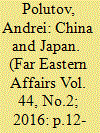

|
|
|
|
|
| Summary/Abstract |
This article examines the problem of the territorial dispute between China and Japan over the Senkaku/Diaoyudao Islands, along with the associated issues of developing oil and gas resources and the fishing industry in that region of the East China Sea, plus the military and political aspects of both sides' territorial claims.
|
|
|
|
|
|
|
|
|
|
|
|
|
|
|
|
| 4 |
ID:
179558
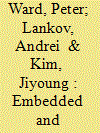

|
|
|
|
|
| Summary/Abstract |
North Korea today is a most unusual post-socialist state. Market actors and market prices are integral to economic life, but private property remains illegal, and private enterprise outside the household is de jure non-existent. In such an institutional context, some market processes are more autonomous in relation to the state, while others are more embedded within state structures. In this article, we offer a theoretical account of the shape that North Korea's market economy has taken, developed from a set of fishing industry case studies. We note four broad categories of enterprises: closely embedded, loosely embedded, semi-autonomous, and autonomous. By relative autonomy/embeddedness we mean control over fixed assets, cash flow, and operational decisions such as wage and price setting. We postulate three major determinants of embeddedness/autonomy: (1) relative strategic resource scarcity between state and market actors, (2) monitoring costs, and (3) institutional evolution that reflects these realities, though to varying extents.
|
|
|
|
|
|
|
|
|
|
|
|
|
|
|
|
| 5 |
ID:
188876
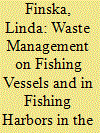

|
|
|
|
|
| Summary/Abstract |
This article aims to map and provide an overview of international, regional, and national law applicable to marine waste in the Barents Sea, and to analyze fishing industry actors’ practices and perceptions of marine waste. We identify gaps between the law and its implementation, enforcement, and practice. The legal framework for marine plastic pollution in the Barents Sea and the Arctic is fragmented and not harmonized. Insufficient waste management facilities and regulations are likely to hinder compliance with existing regulations. There is an urgent need to upgrade the waste management infrastructure for the fishing industry in Norway and in northwest Russia.
|
|
|
|
|
|
|
|
|
|
|
|
|
|
|
|